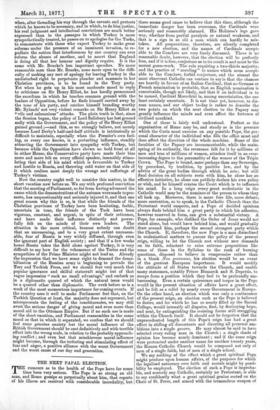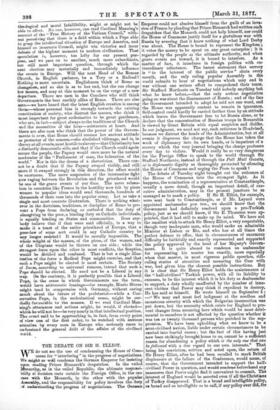THE NEXT PAPAL ELECTION.
Mrumours as to the health of the Pope have for some ime been very serious. The Pope is so strong an old . man, and Rome gossips so perpetually about him, that reports of his illness are received with considerable incredulity, but
there seems good cause to believe that this time, although the immediate danger has been overcome, the Cardinals were seriously and reasonably alarmed. His Holiness's legs gave way, whether from partial paralysis or natural weakness, and that is a sign in so old a man which can hardly be mis- taken. All preparations, therefore, are silently completed for a new election, and the names of Cardinals accept- able to the Conclave are very freely discussed. There is no reasonable doubt, however, that the election will be perfectly free, and if it is free, conjecture as to its result is and must be the merest guess-work. The rule requiring a two-thirds majority, and the practice of " acceding" to names which seem accept- able to the Conclave, forbid conjecture, and the utmost the most observant Catholic can venture to say is that the chances are heavily in favour of an Italian Cardinal, that no German or French nomination is probable, that an English nomination is conceivable, though not likely, and that if an individual is to be named, Cardinal Morochini is, among uncertainties, the one least certainly uncertain. It is not time yet, however, to dis- cuss names, and our object to-day is rather to describe the two points on which the next election to the Papacy may greatly influence the minds and even affect the fortunes of civilised mankind.
One of these is fairly well understood. Perfect as the organisation of Rome may be, and steady as is the pressure which the Curia must exercise on any possible Pope, the per- sonal character of the individual who fills the office must and does affect the direction of the whole machine. Some of the faculties of the Papacy are incommunicable, while the main- spring of its authority, the reverence felt for it by millions of men and tens of millions of women, attaches itself in an ever- increasing degree to the personality of the wearer of the Triple Crown. The Pope is bound, more perhaps than any Sovereign, by precedent, by tradition, by positive law, and by the advice of the great bodies through which he acts ; but still final decision on all subjects rests with him, he alone has an effective initiative, he alone can publicly declare his own policy or wish, and he himself creates the Court which is to influence his mind. In a long reign every great ecclesiastic in the Catholic world may be the nominee of the person to whom they all look up. Moreover, there is more free life, more debate, more contention, so to speak, in the Catholic Church than the Protestant World suspects, and a Pope of decided opinions always finds behind him a great party to which his adhesion, however reserved in form, can give a substantial victory. A Pope, for example, who disliked the Order of Jesus would not stand alone, but would have behind him, and would gradually draw around him, perhaps the second strongest party within the Church. If, therefore, the new Pope is a man disinclined in ecclesiastical matters to pursue the policy of the present reign, willing to let the Church rest without new demands on its faith, reluctant to raise extreme propositions like some of those in the Syllabus to the rank of burning questions, disposed to believe in compromise rather than in a blank Non possumus, his election would be an event of the greatest European importance. It would modify the attitude of all States towards the Church, and enable many statesmen, notably Prince Bismarck and S. Depretis, to escape from a position which they feel to be profoundly em- barrassing. Even a certain quiescence and torpor in the Pope would in the present situation of affairs have a great effect,
and be felt as a relief by nearly every Government in Europe. On the other hand, an election which was only a continuance of the present reign, an election such as the Pope is believed to desire, and for which he has so nearly filled up the Sacred College, would intensify all disputes, first, by destroying hope, and next, by extinguishing the resisting forces still struggling within the Church itself. It should not be forgotten that the unprecedented length of this Pope's reign has had a great effect in stiffing all discontents and directing all personal am-
bitions into a single groove. He may almost be said to have selected every ruling man in the Church ; a single shade of
opinion has become nearly dominant ; and if the same reign were protracted under another name for another twenty years, the Roman Catholic Church would be composed not only of men of a single faith, but of men of a single school. We say nothing of the effect which a great spiritual Pope might produce upon human affairs, of the purposes for which the legalised autocracy over faith and morals might by possi- bility be employed. The election of such a Pope is improba- ble, and scarcely any Catholic, certainly no Protestant, is able to say confidently what a great spiritual genius seated on the Chair of St. Peter, and armed with the tremendous weapon of
theological and moral Infallibility, might or might not be able to effect. No one, however, can read Cardinal Manning's account of the " True History of the Vatican Council," with- out perceiving that there is a field within which a Pope able to grasp the intellectual situation of Europe and America, and himself an inearnate Council, might win victories and incur defeats of the highest moment to modern civilisation. That speculation is, however, too lofty for our present pur- pose, and we pass on to another, much more subordinate, but still most important question, through which the nett election may materially and immediately influence the events in Europe. Will the next Head of the Roman Church, in English parlance, be a Tory or a Radical ? Nothing is more uncertain. Englishmen think of Rome as changeless, and so she is as to her end, but she can change her means, and may at this moment be on the verge of a new departure. There are men in the Conclave who still think Governments the best earthly allies of Rome. There are also men—we have heard that the latest English creation is among them—whose personal bias is strongly towards the existing constitution of society, who distrust the masses, who think it most important for great ecclesiastics to be great gentlemen, who are, in fact—subject always to the traditions of the Church and the necessities of the hour—aristocrats at heart. And there are also men who think that the power of the Govern- ments is over, that Rome should resume her ancient attitude as protector of the masses,—she abolished villenage, and is, in theory at all events, most hostile to slavery—that Christianity has a distinctly democratic side, and that if the Church could again secure the people, the Papacy would once more be the natural moderator of the " Parliament of man, the federation of the world." Nor is this the dream of a rhetorician. There can- not be a doubt that if the Papacy swayed visibly, and still more if it swayed strongly in this direction, the effect would be enormous. The mere suspension of the internecine fight now raging between the Revolution and the priesthood would be one of the grave events of our time. The mere relaxa- tion in countries like France in the hostility now felt by pious women to popular ideas would send thousands, hundreds of thousands of their sons into the popular army. Let us take a single and most concrete illustration. There is nothing what- ever in the doctrines, traditions, or discipline of Rome to pre- vent a Pope from declaring ex cathedra that the duty of almsgiving to the poor, a binding duty on Catholic individuals, is equany bending on States and communities. Does any- body believe that if that were said officially, in a way to make it a tenet of the entire priesthood of Europe, that a poor-law of some sort could in any Catholic country be any longer resisted It would be morally impossible. The whole weight of the masses, of the pious, of the women, and of the Utopians would be thrown on one side ; while the strongest force upon the other in most conflicts, the Sceptics, would be divided and confused. That is but a single illus- tit:4km of the force a Radical Pope might exercise, and that such a Pope might be elected is most certain. The Society of Jesusi, a000rding to universal rumour, intend that such a Pope should he elected. He need not be a Liberal in any way. On the contrary, it is perfectly possible that a Liberal Popes in the sense in which Governments use the term,. would have aristocratic leanings—for example, Riario Sforaa might tend to compromise with Germany, without caring mu& about the future of the proletariat—while a Con- servative Pope, in the ecclesiastical sense, might be cor- dially favourable to the masses. If we read Cardinal Man- ning's utterances and actions aright, he would, if elected- whioh he will not be—be very nearly in that intellectual position. The event said to be approaching is, in fact, from every point of view one of the first order, to be watched with anxious attention by every man in Europe who seriously cares to understand the general drift of the affairs of the civilised world.
•



































 Previous page
Previous page